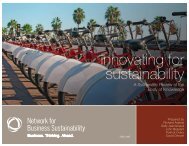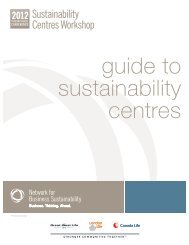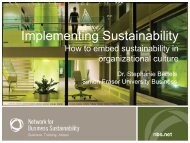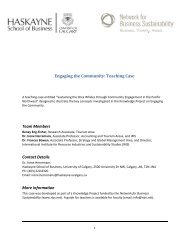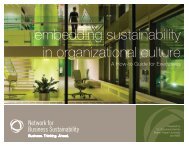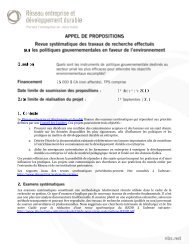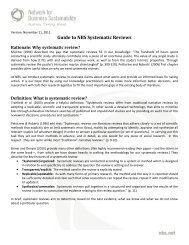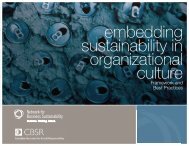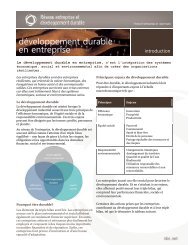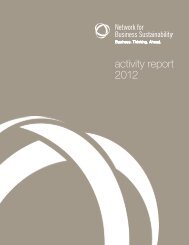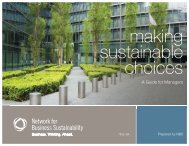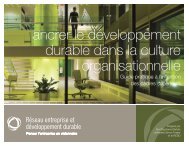Summary Report - Network for Business Sustainability
Summary Report - Network for Business Sustainability
Summary Report - Network for Business Sustainability
Create successful ePaper yourself
Turn your PDF publications into a flip-book with our unique Google optimized e-Paper software.
KNOWLEDGE PROJECT SERIES<br />
Knowledge Forum on<br />
<strong>Business</strong> Adaptation<br />
to Climate Change<br />
ISSUE DATE: FEBRUARY 2009
Knowledge Forum on <strong>Business</strong><br />
Adaptation to Climate Change<br />
AUTHORS<br />
CHARLES BACKMAN, PhD Candidate, University of Calgary<br />
NATALIE SLAWINSKI, PhD Candidate, Richard Ivey School of <strong>Business</strong><br />
DAVID VAN DEN ASSEM, MBA Candidate, University of Calgary<br />
CONNIE VAN DER BYL, PhD Candidate, University of Calgary<br />
ZANE WESTERBEEK, MBA Candidate, University of Calgary<br />
ERIN WHITE, Research <strong>Network</strong> <strong>for</strong> <strong>Business</strong> <strong>Sustainability</strong><br />
Hosted by the Research <strong>Network</strong> <strong>for</strong> <strong>Business</strong> <strong>Sustainability</strong>, the<br />
International Resource Industries and <strong>Sustainability</strong> Centre at the<br />
Haskayne School of <strong>Business</strong>, and the Calgary Chamber of Commerce.<br />
TO LESSEN OUR IMPACT ON THE ENVIRONMENT, THIS REPORT<br />
IS ONLY AVAILABLE ELECTRONICALLY AS A PDF DOCUMENT.<br />
<strong>Business</strong> Adaptation to Climate Change ii
Executive <strong>Summary</strong><br />
Fifty managers, academics and policy-makers shared the insight of five expert<br />
speakers at the Research <strong>Network</strong> <strong>for</strong> <strong>Business</strong> <strong>Sustainability</strong>’s Knowledge Forum on<br />
<strong>Business</strong> Adaptation to Climate Change. The event was hosted by the International<br />
Resource Industries and <strong>Sustainability</strong> Centre at the Haskayne School of <strong>Business</strong><br />
and the Calgary Chamber of Commerce, on November 28, 2009. The purpose of the<br />
Forum was to bring the communities of research and practice together to engage<br />
in a conversation on business adaptation to climate change. A few themes emerged<br />
from the presentations and discussions throughout the day.<br />
First, current company practices, government policies and academic research are<br />
focused largely on mitigation and not adaptation. Across almost all sectors, firms<br />
have created carbon inventories, but few treat their inventories as a material financial<br />
risk. This behaviour may be the result of a general lack of agreement, noted<br />
throughout the day by Forum participants, on how organizations will be affected<br />
by climate change.<br />
Second, to adapt to climate change, managers should conduct a vulnerability risk<br />
assessment across the supply chain to consider potential impacts, origins and<br />
timelines. Monika Winn, from the University of Victoria, stated that the development<br />
of an inventory of vulnerability across the organization is a key success factor to<br />
ensuring a firm’s survival. Allan Amey, from ICF Consulting Canada, presented a threestage<br />
screening framework that businesses can use to analyze climate change risks<br />
and assess the need <strong>for</strong> adaptive measures.<br />
It is equally important to select a strategy and focus on either innovation or<br />
compensation. According to Jonatan Pinkse, from the Amsterdam <strong>Business</strong> School,<br />
to adapt to climate change, firms can undertake innovation strategies focusing on<br />
process improvements, new product or market development, or compensation<br />
strategies focusing on emissions reductions and trading.<br />
Last, there is a need <strong>for</strong> more robust knowledge to base business and policy decisions.<br />
Robert Page, chair of the National Roundtable on the Environment and the Economy,<br />
said that until better climate change data are available, businesses must continue<br />
incorporating additional rough risk factors into technical designs and financial models.<br />
In the dialogue sessions, many participants noted there is a role <strong>for</strong> academics<br />
and governments to make available such data so that managers can make betterin<strong>for</strong>med<br />
business decisions. To that end, the <strong>Network</strong> commissioned David Nitkin,<br />
president of EthicScan, to review the gamut of academic and practitioner literature<br />
examining business adaptation to climate change. His findings will be available in the<br />
summer of 2009.<br />
All the presentations summarised in this report, as well interviews with the speakers<br />
are available on the event website.<br />
<strong>Business</strong> Adaptation to Climate Change iii
Table of Contents<br />
Forum Overview 1<br />
Overview of the <strong>Business</strong> Adaptation to Climate Change Project 2<br />
Mr. David Nitkin, President of EthicScan Canada Ltd.<br />
Climate Adaptation and <strong>Business</strong> Risks 3<br />
Context, Challenges and Potential Solutions<br />
Dr. Robert Page, Chair, National Roundtable on the Environment and the Economy (NRTEE)<br />
An Overview of <strong>Business</strong> Responses to Climate Change 5<br />
Dr. Jonatan M. Pinkse, Amsterdam <strong>Business</strong> School<br />
Organizational Resilience to the Physical Impacts of Climate Change 7<br />
Dr. Monika Winn, Professor, University of Victoria<br />
Policy, Technology and Economics of Adaptation 9<br />
Allan Amey, Senior Fellow, ICF Consulting Canada, Inc.<br />
<strong>Summary</strong> of Dialogue Sessions 11<br />
Worst Practices in <strong>Business</strong> 11<br />
Challenges & Opportunities <strong>for</strong> Companies 11<br />
Challenges & Opportunities <strong>for</strong> Government 11<br />
The Bigger Challenges 11<br />
Appendix A: Speaker Biographies 12<br />
Appendix B: Leadership Council Members 16<br />
<strong>Business</strong> Adaptation to Climate Change iv
Forum Overview<br />
This report summarizes the proceedings of the<br />
Knowledge Forum on <strong>Business</strong> Adaptation to<br />
Climate Change, hosted by the Research <strong>Network</strong><br />
<strong>for</strong> <strong>Business</strong> <strong>Sustainability</strong>, the International<br />
Resource Industries and <strong>Sustainability</strong> Centre<br />
and the Calgary Chamber of Commerce on<br />
November 28, 2008.<br />
The day-long event brought together over 50<br />
representative from business, government and<br />
academia. Attendees heard five presentations from<br />
respected academic and business authorities (see<br />
Appendix A <strong>for</strong> speaker biographies) on the topic<br />
of business adaptation to climate change. Delegates<br />
had the opportunity to share their views on<br />
challenges and opportunities in dialogue sessions.<br />
The report highlights the main ideas, provocative<br />
questions, and key take-aways from these sessions.<br />
The purpose of this event was to advance our<br />
thinking by examining what we know and what we<br />
do not know within academia, industry, government,<br />
and non-governmental organizations. Each of these<br />
groups brings different knowledge of and perspective.<br />
Bringing them together created a tremendous<br />
learning opportunity.<br />
The Forum fits into a larger initiative underway at the<br />
<strong>Network</strong>. Every year, the <strong>Network</strong>’s Leadership Council<br />
(see Appendix B) identifies the greatest challenges<br />
facing sustainability practitioners (2008-9 Knowledge<br />
Priorities.) Based on the top two priorities, two<br />
systematic reviews are produced. One of this year’s<br />
projects is on business adaptation to climate change,<br />
led by David Nitkin from EthicScan Canada. His final<br />
reports will be available in the summer of 2009.<br />
<strong>Business</strong> Adaptation to Climate Change 1
Overview of the <strong>Business</strong> Adaptation<br />
to Climate Change Project<br />
David Nitkin, President of EthicScan Canada Ltd.<br />
Written by Erin White, Research <strong>Network</strong> <strong>for</strong> <strong>Business</strong> <strong>Sustainability</strong><br />
KEY TAKE-AWAYS<br />
Nitkin’s project will determine what we know, what we think we know,<br />
and what we do not know about business adaptation to climate change.<br />
His findings will be available in the summer of 2009.<br />
Climate change is becoming<br />
a prevalent issue in<br />
Canadian business. Each<br />
year, companies are faced<br />
with new challenges. Until<br />
recently, the business focus<br />
has been on climate change<br />
mitigation. In the future, the focus will need to include<br />
adaptation as well. David Nitkin, president of EthicScan,<br />
was selected by the <strong>Network</strong> to review the gamut of<br />
academic and practitioner literature examining business<br />
adaptation to climate change.<br />
Nitkin will examine management concerns related to<br />
the challenges of implementing adaptation to climate<br />
change, the associated costs and the potential risks to<br />
business. His systematic review will employ scientific<br />
methodology and rigour to produce transparent and<br />
replicable results and minimize bias.<br />
Nitkin hopes to learn from the experiences of others—<br />
what has been done to adapt to climate change and<br />
why? Literature from academic and practitioner<br />
sources will be tapped but there are many sources of<br />
in<strong>for</strong>mation beyond academia that may have more<br />
relevant and practical in<strong>for</strong>mation. Nitkin will include<br />
different perspectives and assemble other research<br />
sources outside academia. He will examine what we<br />
know, what we think we know, and what we do not<br />
know about business adaptation to climate change.<br />
The systematic review findings will be relevant across<br />
sectors. Nitkin will examine the risks and opportunities<br />
and present the findings by the following sectors:<br />
agriculture, finance, <strong>for</strong>estry, energy, fisheries, tourism<br />
and mining. He will include climate change impacts,<br />
current firm or sector strategies and potential<br />
adaptation strategies. His findings will be available<br />
in the summer of 2009.<br />
<strong>Business</strong> Adaptation to Climate Change 2
Climate Adaptation and <strong>Business</strong> Risks<br />
Context, Challenges and Potential Solutions<br />
Dr. Robert Page, Chair, National Roundtable on the Environment and the Economy (NRTEE)<br />
Written by David Van Den Assem, MBA Candidate, University of Calgary<br />
KEY TAKE-AWAYS<br />
Mitigation addresses the causes of climate change and adaptation addresses its consequences.<br />
Climate change is introducing new types of uncertainty into organizations, which<br />
some businesses address through Enterprise Risk Management (ERM) systems.<br />
Until more robust climate change data are available, businesses must continue incorporating<br />
additional, rough risk factors into technical designs and financial models.<br />
According to Dr. Robert<br />
Page, respected nationally<br />
and internationally <strong>for</strong> his<br />
work on energy and the<br />
environment, climate<br />
change is introducing new<br />
types of uncertainty into<br />
organizations. <strong>Business</strong>es<br />
can respond to climate<br />
change through mitigation<br />
and adaptation, but to respond appropriately, they<br />
must understand the difference between the two.<br />
Page defined adaptation as the “adjustment in natural<br />
or human systems in response to actual or expected<br />
climate stimuli or their effect which moderates harm or<br />
exploits beneficial opportunities.” 1 Adapting to climate<br />
change means decreasing vulnerability or addressing<br />
1 Intergovernmental Panel on Climate Change (IPCC) Third Assessment <strong>Report</strong> – Working Group II<br />
the consequences of climate change. On the other<br />
hand, mitigation focuses on preventing further change<br />
(see diagram). Both are essential but require very<br />
different types of policy responses. Until recently,<br />
regulatory and policy work has been predominantly<br />
focused on mitigation but in the long-term, adaptation<br />
activities may prove to be more important given the<br />
inevitability of climate change.<br />
<strong>Business</strong> Adaptation to Climate Change 3
GROWING MARKET FOR CORPORATE RESPONSIBILITY<br />
Figure 1<br />
SEPARATING MITIGATION AND<br />
ADAPTATION PROCESS<br />
Mitigation<br />
Causes<br />
CO 2 Cuts On<br />
Capture<br />
Regulatory<br />
Compliance<br />
Primarily<br />
Long Term<br />
& Global<br />
Climate Change<br />
Adaptation<br />
Consequences<br />
Technology<br />
& Process<br />
Adaptations<br />
Voluntary<br />
Management<br />
Primarily<br />
Short Term<br />
& Regional<br />
BOTH ARE ESSENTIAL BUT VERY DIFFERENT TYPES OF<br />
POLICY CHALLENGES FOR ALBERTA BUSINESS.<br />
Page explained the business risk from climate change is<br />
related to the rate and intensity of environmental change<br />
experienced. This change is not a continuous transition<br />
but is highly variable and random, complicating the<br />
ability of businesses to respond in a planned, consistent<br />
manner. Risk arises from a combination of exposure<br />
to environmental changes and vulnerability to these<br />
changes. Organizations with more built-in resilience can<br />
withstand greater environmental changes than those<br />
with a low tolerance <strong>for</strong> environmental change.<br />
Identifying and incorporating environmental risks into<br />
business planning is critical <strong>for</strong> building resiliency.<br />
Enterprise Risk Management (ERM) is a useful method<br />
to incorporate environmental uncertainty into business<br />
planning. Some companies have already implemented<br />
ERM to account <strong>for</strong> increased fire risk in the <strong>for</strong>estry<br />
industry and decreased water availability <strong>for</strong> oil, gas<br />
and agricultural activities.<br />
The utility of ERM and other business tools <strong>for</strong> managing<br />
climate adaptation is limited by the availability and<br />
reliability of data on climate change, without which<br />
in<strong>for</strong>med business decisions cannot be made. Today’s<br />
climate data sets, models, and detailed climate<br />
projections are too imprecise <strong>for</strong> rigorous decisionmaking.<br />
There is a role <strong>for</strong> governments and academics<br />
to make data available, which will help industry make<br />
more in<strong>for</strong>med decisions.<br />
Until more research becomes available, businesses<br />
will have to respond to climate-related stressors by<br />
incorporating additional, rough risk factors into technical<br />
designs of facilities, and applying adaptive management<br />
procedures to reduce vulnerability.<br />
Page believes that Canada and other northern countries<br />
will experience the most dramatic changes from climate<br />
change and will need to become leaders in adaptation.<br />
To take that leadership position, government and<br />
business must increase their awareness to adapt to<br />
climate change, so that they can recognize their<br />
vulnerabilities and develop cost-effective solutions.<br />
<strong>Business</strong> Adaptation to Climate Change 4
An Overview of <strong>Business</strong> Responses to Climate Change<br />
Dr. Jonatan M. Pinkse, Amsterdam <strong>Business</strong> School<br />
Written by Connie Van der Byl, PhD Candidate, University of Calgary<br />
KEY TAKE-AWAYS<br />
Organizations are pursuing mitigation and not adaptation strategies.<br />
Across almost all sectors, firms have created carbon inventories, but relatively few have<br />
developed emissions targets and fewer yet treat their inventories as a material financial risk.<br />
To adapt to climate change, firm can undertake innovation strategies focusing on process<br />
improvements, new product or market development, or compensation strategies focusing on<br />
emissions reductions and trading.<br />
According to the<br />
Amsterdam <strong>Business</strong><br />
School’s Dr. Jonatan Pinkse,<br />
author of International<br />
<strong>Business</strong> and Global Climate<br />
Change, companies are not<br />
concerned with adaptation<br />
to climate change, but are<br />
instead focusing their<br />
attention on mitigation. He<br />
attributed this response partly to the fact that some<br />
companies still do not acknowledge or understand<br />
how adaptation to climate change is a business issue.<br />
Pinkse claimed that regulation used to drive climate<br />
change agendas in companies. He suggested that<br />
factors such as stakeholder pressure and the risk of<br />
physical harm are now driving corporate responses. He<br />
described three self-regulatory approaches that firms<br />
presently take to climate change: voluntary agreements,<br />
multi-stakeholder initiatives and carbon trading.<br />
Voluntary agreements create awareness but do not<br />
necessarily lead to real emissions reductions. If included<br />
as part of a climate policy, they create minimal pressure<br />
to exceed business as usual. Multi-stakeholder initiatives<br />
could result in target setting and best practices <strong>for</strong><br />
emissions reductions. Some initiatives have shifted from<br />
lobbying government to do less to lobbying the<br />
government to do more. Carbon trading begins with<br />
an inventory of emissions followed by setting a target,<br />
disclosure of carbon levels and ultimately the reduction<br />
of emissions. Across almost all sectors, firms have<br />
created carbon inventories, but relatively few firms<br />
have actually developed emissions targets and fewer<br />
yet treat their inventories as a material financial risk.<br />
One study showed that only six of 23 automobile<br />
firms disclosed carbon emissions in their Securities<br />
and Exchange Commission filings.<br />
Pinkse suggested that firms have several options to<br />
adapt their strategies to climate change. Innovation<br />
strategies focus the firm on process improvements, new<br />
product or market development, while compensation<br />
strategies focus on emissions reductions and trading.<br />
In Pinkse’s view, innovation holds the promise of winwin<br />
solutions but is more challenging to implement<br />
because of uncertainty and high costs.<br />
Firms also have several strategic responses to<br />
emissions trading (see diagram). Con<strong>for</strong>mists<br />
grudgingly respond to high regulatory expectations,<br />
while evaders feel no need to respond. Entrepreneurs<br />
take advantage and find value in responding to the<br />
inevitable. Some blame arbitrageurs <strong>for</strong> reaping value<br />
without investing in technology or emissions reductions.<br />
<strong>Business</strong> Adaptation to Climate Change 5
Table 1<br />
STRATEGIC RESPONSES TO EMISSIONS TRADING<br />
EXECUTED<br />
REGULATORY<br />
CONSTRAINT<br />
HIGH<br />
LOW<br />
Amsterdam <strong>Business</strong> School<br />
Con<strong>for</strong>mist<br />
Evader<br />
OPPORTUNITY<br />
RECOGNITION<br />
LOW HIGH<br />
Pinkse shared a number of lessons from Europe’s<br />
experience in the emissions trading market. Most<br />
European companies are motivated to participate<br />
<strong>for</strong> compliance reasons. The price of carbon is a<br />
major problem because it keeps changing, leading to<br />
uncertainty and difficult decision-making. If carbon were<br />
priced higher, radical innovation would be more likely.<br />
Coal-fired plants are still being built and carbon capture<br />
and storage projects are being cancelled, which are<br />
indications that the market is not working.<br />
Pinkse noted that firms in countries, like the Netherlands,<br />
have been living below sea level <strong>for</strong> more than fifty<br />
years, will adapt more readily than others. However,<br />
he worried that firms in developing nations such as<br />
Bangladesh, which has little adaptive capacity, will face<br />
much more serious adaptation challenges. Similarly,<br />
firms in northern regions such as Canada, which will see<br />
a more drastically changing climate—a call to action <strong>for</strong><br />
Canadian managers.<br />
Entrepreneur<br />
Arbitrageur<br />
<strong>Business</strong> Adaptation to Climate Change 6
Organizational Resilience to the Physical Impacts of Climate Change<br />
Dr. Monika Winn, Professor, University of Victoria<br />
Written by Charles Backman, PhD Candidate, University of Calgary<br />
GROWING MARKET FOR CORPORATE RESPONSIBILITY<br />
KEY TAKE-AWAYS<br />
Extreme weather events will severely challenge business as usual and may threaten firm survival.<br />
The development of an inventory of vulnerabilities across the organization and its supply chain<br />
appears to be a key success factor to enhance the firm’s adaptation and resilience.<br />
To adapt to climate change, better climate change data are required to understand the nature,<br />
type, severity and probability of direct climate impacts.<br />
Dr. Monika Winn, professor at<br />
the University of Victoria, has<br />
focused much of her research<br />
on one big question: how can<br />
organizations adapt to and build<br />
resilience against the physical<br />
impacts of climate change,<br />
such as extreme weather<br />
events? She believes that once<br />
managers understand the risks,<br />
their origins and timeline (see diagram), they can<br />
adapt by minimizing the impacts or by taking<br />
advantage of the changes.<br />
Direct climate change impacts may include floods,<br />
storms, droughts or rising sea levels. Indirect impacts<br />
may include changing stakeholder behaviours, and<br />
shifting regulatory, legal and competitive landscapes.<br />
Abrupt changes such as extreme weather events and<br />
sudden changes in consumer behaviour stress a firm’s<br />
adaptive mechanism. More gradual changes, such as<br />
rising sea levels or regulatory changes, call <strong>for</strong> different<br />
types of adaptation, but may also threaten firm survival.<br />
The combination of routines, capabilities and resources<br />
within a firm will enhance its ability to withstand shocks<br />
from the external environment. A firm’s resistance to<br />
failure and the ability to recover from an external<br />
disturbance helps reduce its vulnerability.<br />
Academic research often in<strong>for</strong>ms business decisions<br />
with robust knowledge. Un<strong>for</strong>tunately, research on<br />
business adaptation to climate change is in the early<br />
stages and slowly developing from strands of research<br />
in various fields including risk management, and has<br />
only recently begun incorporating the challenges of<br />
climate adaptation.<br />
The organizational adaptation literature discusses some<br />
processes and approaches but tends to concentrate on<br />
incremental adaptation to predictable change. It offers<br />
some insight on adaptation of industry structures or<br />
institutional conditions as a result of technological<br />
discontinuities, but it has not focused on the more<br />
systemic threats stemming from climate change.<br />
The sustainability literature focuses on the firm’s impact<br />
on the natural and broader social environment. Very<br />
little work looks at how the natural environment<br />
impacts the firm. The crisis management literature<br />
examines the identification, <strong>for</strong>ecasting and prevention<br />
of low probability, high impact events. It focuses on<br />
defensive capabilities rather than building long-term<br />
adaptation and resilience.<br />
<strong>Business</strong> Adaptation to Climate Change 7
Table 1<br />
STRATEGIC RESPONSES TO EMISSIONS TRADING<br />
SYSTEM FOCUS<br />
ECOLOGICAL<br />
SYSTEM<br />
SOCIO-<br />
ECONOMIC<br />
SYSTEM<br />
e.g.<br />
Extreme<br />
weather<br />
events<br />
e.g.<br />
Sudden change in<br />
consumer behaviour<br />
SUDDEN<br />
DISCONTINUOUS<br />
FIRM<br />
TIME SCALE<br />
e.g.<br />
Rising sea<br />
surface level<br />
e.g.<br />
Legal changes<br />
on a long term basis<br />
GRADUAL<br />
Some research is examining mechanisms built into an<br />
organization that allow it to adapt to outside influences<br />
and ensure its survival following extreme events (e.g.,<br />
hurricane Katrina and the 9/11 terrorist attacks). The<br />
development of an inventory of vulnerability across the<br />
organization and its supply chain appears to be a key<br />
success factor <strong>for</strong> enhancing the firm’s adaptation,<br />
resilience, and even chances <strong>for</strong> survival.<br />
To adapt to climate change, then, it will be necessary<br />
to better understand the nature, type, severity and<br />
probability of climate related events and their impacts<br />
on firms. Presently, a lack of in<strong>for</strong>mation makes<br />
probability assessments difficult to produce. Better<br />
climate change data and a better understanding of<br />
organizational processes are needed to effectively<br />
adapt to and reduce the impacts from climate change.<br />
<strong>Business</strong> Adaptation to Climate Change 8
Policy, Technology and Economics of Adaptation<br />
Allan Amey, Senior Fellow, ICF Consulting Canada, Inc.<br />
Written by Zane Westerbeek, MBA Candidate, University of Calgary<br />
GROWING MARKET FOR CORPORATE RESPONSIBILITY<br />
KEY TAKE-AWAYS<br />
Interest and attention to adaptation is an emerging trend.<br />
Adaptation should begin with an assessment of the risks posed by climate change<br />
across the entire value chain, which frameworks can facilitate.<br />
Understanding and analyzing climate risk may also reveal new business opportunities.<br />
Recently, the Carbon Disclosure<br />
Project, an independent not<strong>for</strong>-profit<br />
organisation with the<br />
largest corporate greenhouse<br />
gas emissions database in<br />
the world, identified four<br />
industries most concerned about<br />
the impacts of climate change.<br />
These include the insurance, oil<br />
and gas, electric utilities, and the<br />
beverages, tobacco, and food products industries. With<br />
different business sectors facing serious impacts due to<br />
extreme events, the need <strong>for</strong> a framework to identify<br />
and assess meaningful risks is required to deploy<br />
appropriate adaptation strategies.<br />
Allan Amey, from ICF Consulting Canada, described a<br />
framework that businesses can use to analyze climate<br />
change risks and assess the need <strong>for</strong> adaptive measures.<br />
When considering adaptation strategies, firms first need<br />
to identify and address whether action is required.<br />
Amey discussed the need <strong>for</strong> businesses to understand<br />
clearly the risks of climate change, suggesting that risks<br />
may be divided into three categories:<br />
Category 1 refers to potentially significant climate risks,<br />
requiring immediate, short-term management.<br />
Category 2 includes potential climate vulnerabilities,<br />
which do not require immediate action, but instead<br />
require monitoring and assessment over the longer-term.<br />
Category 3 risks are insignificant, requiring no further<br />
consideration.<br />
The classification of risks allows firms to focus<br />
specifically on areas that require action and develop<br />
risk management strategies to address each one in the<br />
longer term. Once the risks have been identified and<br />
classified, firms should undergo a three step screening<br />
process to assess whether adaptive strategies are<br />
required (see diagram).<br />
<strong>Business</strong> Adaptation to Climate Change 9
Figure 1<br />
THREE-STAGE SCREENING<br />
ICF International<br />
Is climate<br />
important<br />
to business<br />
risk?<br />
Y<br />
Physical<br />
assets,<br />
production<br />
processes,<br />
or 0%M?<br />
Is there an<br />
immediate<br />
threat based on<br />
current climate<br />
conditions?<br />
Raw materials,<br />
supplies of inputs,<br />
work<strong>for</strong>ce, or<br />
demand <strong>for</strong><br />
product?<br />
In the first screening stage, it is important to assess<br />
whether climate change poses a serious impact on<br />
business risk. The second stage involves <strong>for</strong>mulating an<br />
understanding of the risk timing and horizon—assessing<br />
the immediacy of the risk as well as the financial<br />
investments required to negate the risk—so that<br />
appropriate anticipatory measures are taken. Key<br />
considerations include the need <strong>for</strong> long-term<br />
investments or contracts, location decisions and<br />
required capital costs.<br />
In the third stage, it is important to gauge the costs of<br />
poorly or inadequately addressing the risk, in order to<br />
quantify the costs of a wrong decision. By conducting<br />
this screening process, businesses can identify the<br />
severity of climate change risk to their business. Should<br />
all three stages pose serious business risk, the firm<br />
should then conduct and assessment to determine<br />
appropriate action.<br />
Y<br />
Water and electric<br />
utilities, transport,<br />
and other public and<br />
private infrastructure<br />
and services?<br />
N Does the threat involve a long-term<br />
investment or contract, a lengthy<br />
implementation period, or substantial<br />
financial outlays involved in decision<br />
making to respond to the threat?<br />
N<br />
Is a high value at<br />
stake if a wrong<br />
decision is made?<br />
Y<br />
Category<br />
1 Risk<br />
Y<br />
N<br />
Take action to<br />
assess risk in detail<br />
and respond<br />
Category<br />
2 Risk<br />
Category 3<br />
Risk?<br />
Climate is not<br />
a high priority?<br />
Monitor and<br />
reassess in<br />
future<br />
According to Amey, interest and attention to adaptation<br />
is an emerging trend. Climate change implications reach<br />
beyond the direct effects of weather changes. Amey<br />
urged businesses to consider the need <strong>for</strong> climate<br />
adaptation and conduct a screening to determine<br />
susceptibility to climate risk.<br />
Lastly, companies should examine the entire value chain<br />
when assessing risk susceptibility as well as consider how<br />
the actions of other organizations, such as government,<br />
will impact their business risk. Understanding and<br />
analyzing climate risk may also reveal new business<br />
opportunities so adaptive measures may be of great<br />
value to businesses.<br />
<strong>Business</strong> Adaptation to Climate Change 10<br />
N
<strong>Summary</strong> of Dialogue Sessions<br />
Written by Natalie Slawinski, PhD Candidate, Richard Ivey School of <strong>Business</strong><br />
Dialogue sessions at the Forum provided participants<br />
with the opportunity to share ideas and to debate<br />
issues. This is a summary of the dialogue among<br />
conference delegates in small break-out sessions<br />
and open group discussions.<br />
WORST PRACTICES IN BUSINESS<br />
When uncertainty exists, the tendency is to do nothing.<br />
<strong>Business</strong> may operate in fear of making the wrong<br />
decision. Yet, this inaction may be creating the inertia<br />
that could lead organizations to be unprepared <strong>for</strong> a<br />
future changed by extreme climate events.<br />
CHALLENGES & OPPORTUNITIES FOR COMPANIES<br />
Arguably, the biggest challenge facing decision-makers<br />
is the uncertainty surrounding climate change. This<br />
uncertainty is driven in part by a lack of understanding<br />
around how organizations and governments will be<br />
impacted by climate change. Companies look to<br />
governments <strong>for</strong> direction on how to act, and what<br />
future regulations will look like and express frustration<br />
when there is a lack of direction.<br />
Many businesses grapple with measuring carbon<br />
emissions. It is expensive and time consuming. It is also<br />
unclear whether firms will receive carbon credits in the<br />
future. Adaptation to climate change requires “gambling<br />
on the future” and letting go of the need <strong>for</strong> hard<br />
numbers and working with reasonable assumptions.<br />
However, without hard and accurate numbers, climate<br />
change simply does not enter into the decision-making<br />
equations <strong>for</strong> some organizations.<br />
Many companies are acting, but it is mostly shorterterm<br />
risk management rather than thinking long-term<br />
and considering adaptation strategies. These firms often<br />
respond to climate change by setting up sustainability<br />
departments, but it is unclear whether or not they<br />
in<strong>for</strong>m strategy.<br />
The lack of agreement regarding climate change<br />
remains a challenge. Some senior executives are<br />
unconvinced that climate change is anthropogenic,<br />
while others may believe it is but do not know how<br />
to take action.<br />
Vague definitions of sustainability may lead to<br />
disagreement about what actions to take, or whether<br />
climate change actions should take priority over more<br />
commonly practiced activities like health and safety.<br />
CHALLENGES & OPPORTUNITIES FOR GOVERNMENT<br />
Governments can create more regulatory certainty and<br />
provide incentives <strong>for</strong> early action on the part of firms.<br />
They can also assist in technology research and invest<br />
in green industries.<br />
There is a need <strong>for</strong> governments to work together to<br />
address concerns about jurisdictional differences in<br />
regulations. They need to take long-term action and<br />
create awareness.<br />
Governments are putting some resources towards<br />
climate change, but are often uncertain in where to<br />
invest tax-payers’ dollars. For example, some believe<br />
that carbon capture and storage may be part of the<br />
solution to climate change, but it remains unproven and<br />
government is wary to invest, putting initiatives on hold.<br />
Governments need to develop a greater understanding<br />
of the constraints faced by companies. For example,<br />
imposing a five-year plan <strong>for</strong> a new technology may<br />
not be realistic.<br />
THE BIGGER CHALLENGES<br />
With increases in the number of catastrophes, people,<br />
organizations and governments must change their<br />
behaviours in order to adapt. Drawing on multiple<br />
stakeholders to generate more realistic solutions may<br />
provide the best hope <strong>for</strong> the future.<br />
Despite many obstacles, solutions exist if leaders are<br />
willing to take bold steps and if people, organizations<br />
and governments have the will. Leaders can think about<br />
the future in spite of short-term pressures. Scenarios<br />
can help with long-term planning and get people to<br />
think about the bigger picture.<br />
<strong>Business</strong> Adaptation to Climate Change 11
Appendix A: Speaker Biographies<br />
ALLEN AMEY<br />
ICF Consulting Canada<br />
Allan Amey has more than 25 years<br />
of energy engineering, technology<br />
development, marketing, economics,<br />
and planning experience and nine years<br />
of experience in the issues related to<br />
climate change economics, technology<br />
implementation and policy development.<br />
Mr. Amey’s main area of interest lies at<br />
the intersection of energy development,<br />
environmental sustainability, and economic<br />
growth. He is interested in the interaction<br />
and interdependency of these three key<br />
societal drivers. He has spoken at<br />
numerous <strong>for</strong>ums on the challenges<br />
related to accelerating global growth<br />
and concerns related to these factors.<br />
Mr. Amey has worked in over 20<br />
countries on energy development<br />
FRANCES BOWEN<br />
Haskayne School of <strong>Business</strong> and<br />
International Resource Industries<br />
and <strong>Sustainability</strong> Centre<br />
Dr. Frances Bowen is an Associate<br />
Professor in Strategy and Global<br />
Management. Her main research interests<br />
cross strategy and organizational theory,<br />
focusing on corporate environmental<br />
strategy. She has examined firm’s<br />
environmental decisions in a variety<br />
of complex decision-making contexts.<br />
Current and recent research projects have<br />
focused on how different theories of the<br />
firm explain firms’ environmental strategy<br />
choices, and how firms might induce<br />
suppliers to participate in environmentally<br />
sound supply chain management.<br />
projects, headed up an energy<br />
technology development and R&D<br />
department in a major energy company.<br />
He has also headed up a non-profit<br />
public private partnership working with<br />
multiple stakeholder groups in the<br />
development of appropriate emission<br />
reduction programs, and has provided<br />
consulting services to a wide variety of<br />
industries on climate change strategies.<br />
Mr. Amey has extensive experience in<br />
strategic planning, scenario planning,<br />
game theory, technology assessment,<br />
and growth options valuation. He has<br />
worked with a variety of clients in the<br />
areas of carbon capture and storage,<br />
energy efficiency, and intellectual<br />
property ownership.<br />
Be<strong>for</strong>e joining Haskayne, Frances held<br />
appointments at both Sheffield University<br />
Management School (1999-2003) and at<br />
the University of Bath (1995-1999). She<br />
became the Director of the International<br />
Institute <strong>for</strong> Resource Industries and<br />
<strong>Sustainability</strong> Studies (IRIS) at Haskayne<br />
on July 1, 2007.<br />
Dr. Bowen’s research has been published<br />
in journals such as the Journal of<br />
Management Studies, British Journal of<br />
Management, Journal of <strong>Business</strong> Ethics,<br />
Production and Operations Management<br />
and International Journal of Operations<br />
and Production Management.<br />
<strong>Business</strong> Adaptation to Climate Change 12
TOM EWART<br />
Research <strong>Network</strong> <strong>for</strong><br />
<strong>Business</strong> <strong>Sustainability</strong><br />
Tom Ewart is Managing Director of<br />
the Research <strong>Network</strong> <strong>for</strong> <strong>Business</strong><br />
<strong>Sustainability</strong>. The <strong>Network</strong> enables<br />
business sustainability by using evidencebased<br />
knowledge to foster collaboration<br />
between research and practice. Tom has<br />
worked at the <strong>Network</strong> since its inception,<br />
helping to conceive the idea, develop<br />
funding proposals, recruit over 500<br />
members, and manage its activities from<br />
funding research to hosting dialogue events.<br />
DAVID NITKIN<br />
EthicScan Canada Ltd.<br />
Mr. David Nitkin is the President of<br />
EthicScan Canada, and is a full-time<br />
corporate ethicist. He does original<br />
writing, teaching, consulting and research<br />
on corporate social accountability,<br />
ethics auditing, and enhancing ethical<br />
management. He will be leading the<br />
knowledge project on <strong>Business</strong><br />
Adaptation to Climate Change.<br />
David consults and trains widely with<br />
a variety of clients, including industry<br />
associations (on topics like the ethics<br />
of stakeholder management; external<br />
expectations of business); the public<br />
Tom has taught business sustainability<br />
courses in the University of Western<br />
Ontario’s Masters of Environment and<br />
<strong>Sustainability</strong> program, and in the<br />
University of Waterloo's Centre <strong>for</strong><br />
Environment and <strong>Business</strong>. He graduated<br />
from the University of Western Ontario as<br />
a gold medalist in the Engineering Faculty<br />
and as an Ivey Scholar in the Honours<br />
Bachelor Administration program.<br />
sector (values and conflict of interest<br />
training; strategic planning in government;<br />
and managing with integrity); corporations<br />
(ethics audits; updating corporate codes<br />
of responsible business practice; and<br />
benchmarking best practice sustainable<br />
business); social agencies (donor screening;<br />
ethical partnering; fundraising management<br />
in not-<strong>for</strong>-profits); and non-governmental<br />
organizations (ethical investment strategies;<br />
demographic and social futures).<br />
<strong>Business</strong> Adaptation to Climate Change 13
ROBERT PAGE<br />
National Roundtable on the<br />
Environment and the Economy<br />
Dr. Bob Page is the Chair of the National<br />
Roundtable on the Environment and<br />
the Economy, and also the TransAlta<br />
Professor of Environmental Management<br />
and <strong>Sustainability</strong> and the University of<br />
Calgary. He is known nationally and<br />
internationally <strong>for</strong> his work on energy and<br />
the environment in areas such as climate<br />
change, emissions trading, environmental<br />
impact assessment, and policy and<br />
regulation. As vice-president, sustainable<br />
development at TransAlta, he was<br />
responsible <strong>for</strong> the corporation's<br />
JONATAN PINKSE<br />
Amsterdam <strong>Business</strong> School<br />
Dr. Jonatan Pinkse is an Assistant<br />
Professor at the Amsterdam <strong>Business</strong><br />
School. His research has focused on<br />
sustainability reporting by multinational<br />
corporations, and strategic responses of<br />
multinational corporations to global<br />
climate change. His interests lie in climate<br />
change, sustainable management,<br />
proactive approach to addressing<br />
greenhouse gas emissions that contribute<br />
to global warming and climate change.<br />
Page is a member of the environment<br />
committee of the National Chamber<br />
of Commerce. He is chair of the Board<br />
of BIOCAP Canada, has served as a<br />
member of the Canadian delegation to<br />
negotiations on the Kyoto climate change<br />
treaty, and is a member of the Board of<br />
the Canadian Water <strong>Network</strong> and the<br />
ENMAX Corporation.<br />
corporate social responsibility,<br />
multinational corporations and<br />
strategic management.<br />
He has published in journals such as<br />
Cali<strong>for</strong>nia Management Review, <strong>Business</strong><br />
Strategy and the Environment, <strong>Business</strong><br />
and Society, and Journal of International<br />
<strong>Business</strong> Studies.<br />
<strong>Business</strong> Adaptation to Climate Change 14
MONIKA WINN<br />
University of Victoria<br />
Dr. Monika Winn is an Associate Professor<br />
of <strong>Business</strong> Strategy and <strong>Sustainability</strong><br />
at the University of Victoria. Dr. Winn’s<br />
research and teaching interests focus on<br />
the many aspects of sustainability strategy.<br />
Her primary research focus is on<br />
organizational and institutional change<br />
related to the challenges of sustainability.<br />
Recent research streams focus on (1)<br />
climate change impacts <strong>for</strong> business; (2)<br />
implications of sustainable “Base of the<br />
Pyramid” approaches <strong>for</strong> marketing to<br />
the poorest of the poor; (3) trans<strong>for</strong>mation<br />
of social into business issues deserving<br />
strategic attention and action.<br />
Her research is published in such journals<br />
as the Academy of Management Review,<br />
Organization Studies, <strong>Business</strong> and<br />
Society, Journal of <strong>Business</strong> Venturing,<br />
British Journal of Management and<br />
others. Prior to attaining her PhD in 1995,<br />
Dr. Winn founded and ran a successful<br />
business in Southern Cali<strong>for</strong>nia.<br />
<strong>Business</strong> Adaptation to Climate Change 15
Appendix B: Leadership Council Members<br />
The <strong>Network</strong> was created with generous funding from the<br />
Richard Ivey School of <strong>Business</strong>, the Leadership Council members,<br />
the Social Sciences and Humanities Research Council of Canada,<br />
and the University of Western Ontario.<br />
<strong>Business</strong> Adaptation to Climate Change 16
RESEARCH NETWORK<br />
BUSINESS SUSTAINABILITY<br />
Research <strong>Network</strong> <strong>for</strong> <strong>Business</strong> <strong>Sustainability</strong><br />
Richard Ivey School of <strong>Business</strong><br />
University of Western Ontario<br />
1151 Richmond Street<br />
London, Ontario, Canada N6A 3K7<br />
Telephone 519 661 2111 x80094<br />
Fax 519 661 3485<br />
contact@sustainabilityresearch.org<br />
www.sustainabilityresearch.org



